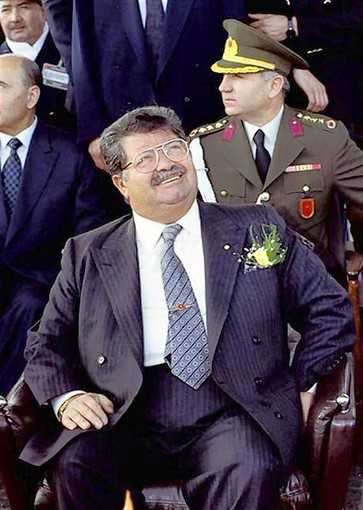Can Sezer Reuters
9:25 a.m. CST, November 4, 2012
 ISTANBUL (Reuters) – An autopsy on late President Turgut Ozal, who led Turkey out of military rule in the 1980s and whose body was exhumed last month, will reveal he was poisoned, his son believes, calling for a full investigation of the “dark years” two decades ago when he died.
ISTANBUL (Reuters) – An autopsy on late President Turgut Ozal, who led Turkey out of military rule in the 1980s and whose body was exhumed last month, will reveal he was poisoned, his son believes, calling for a full investigation of the “dark years” two decades ago when he died.
Ahmet Ozal was speaking after a newspaper report said high levels of poison had been identified by the autopsy, carried out after his father’s body was dug up on the orders of prosecutors investigating suspicions of foul play in his death.
State forensic authorities have denied the media report.
Ozal’s moves to end a Kurdish insurgency and create a Turkic union with central Asian states have been cited as motives for would-be enemies in the shadowy “deep state”, in which security establishment figures and criminal elements colluded.
Ozal died of heart failure while in office in April 1993 at the age of 65. After undergoing a triple heart bypass operation in the United States in 1987, he kept up a grueling schedule while remaining overweight until he died.
But his family believe he was the victim of a plot.
“Even though 19 years have passed, thanks to technological advances and rigorous investigation they are capable of finding poisonous substances … I believe they will be found,” former member of parliament Ahmet Ozal told Reuters late on Saturday.
“I am 100 percent sure his death was not normal. If it is indeed proven, then Turkey should thoroughly investigate the dark years,” he said, noting that top investigative journalist Ugur Mumcu was killed in a car bomb the year Ozal died.
It was Turkey’s military leaders who appointed him as a minister after a period of military rule following a 1980 coup.
Ozal went on to dominate Turkish politics during his period as prime minister from 1983-89. Parliament then elected him president, but those close to him believe his reform efforts displeased some in the security establishment.
While prime minister, Ozal survived an assassination attempt by a right-wing gunman in 1988 when he was shot at a party congress, suffering a wounded finger. Ahmet Ozal said he believed there was a cover-up over the assassination attempt.
“If the assassination (attempt) is investigated … we may see interesting connections to things happening these days. It could also offer an insight into my father death,” he said, noting a presidential order would be needed for such an investigation.
Turkish political history has been littered with military coups, alleged anti-government plots and extra-judicial killings. A court is currently trying hundreds of suspects allegedly linked to a nationalist underground network known as “Ergenekon” accused of plotting to overthrow the government.
Turgut Ozal’s brother, Korkut Ozal, said in 2010 he believed Ergenekon had killed the president. ‘Extrajudicial killings’ were common at that time and have been blamed on shadowy militant forces with ties to the state.
STRYCHNINE CLAIM DENIED
Those suspicious about his death have pointed to efforts which Ozal made to end the conflict with Kurdish militants during his time in office, including securing a Kurdistan Workers Party (PKK) ceasefire shortly before his death.
A report in Bugun newspaper on Friday said it had obtained a copy of the autopsy which revealed high levels of “strychnine creatine” in Ozal’s body.
Strychnine is a highly toxic alkaloid used as a pesticide which causes muscular convulsions and death through asphyxia. Creatine is an organic acid which supplies energy for muscle contraction.
However, the head of the state forensic medicine institute, Haluk Ince, said such a substance had not been found and the report had not yet been completed.
“We did not find the material referred to in the newspaper story. We don’t know how that story came about,” Ince told reporters in the wake of the Bugun article, adding the institute aimed to complete its work in December.
No post-mortem examination was conducted at the time of Ozal’s death, reportedly at the request of his widow.
Viewed as a visionary who helped pave the way for the free market economic policies under which modern Turkey has thrived, Ozal also gave firm support to the West, supporting the U.S.-led coalition which expelled Iraq from Kuwait in 1991.
Ahmet Ozal said his father helped transform Turkey from a coup-torn, state-run economy to the emerging power it is now, boosting freedom of expression, religion and private enterprise.
“This was the foundation that gave birth to modern Turkey. Along with this, perhaps the most important was the transformation of people’s mindset. With that you can change anything,” he said.
(Writing by Daren Butler; Editing by Jon Hemming)
via Turkish ex-president’s autopsy fuels poisoning speculation – chicagotribune.com.

Leave a Reply